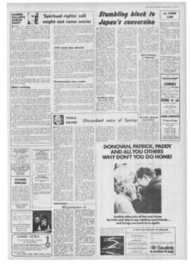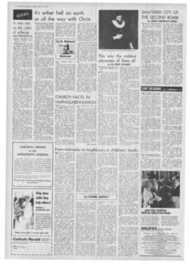Page 10, 27th March 1970
Page 10

Report an error
Noticed an error on this page?If you've noticed an error in this article please click here to report it.
Tags
Share
Related articles
What Does The Future Hold Now For Bishop Lamont?
Rhodesia Udi Is Condemned By Bishops
Rhodesia Has Suppressed Torture Study
Collision Course In Rhodesia
Rhodesian Catholics Against Race 13111
RHODESIAN BISHOPS' FULL STATEMENT
THE full text of the Rhodesian bishops' statement, entitled A Crisis of Conscience, is as follows: "Before the referendum last June, we spoke to you in a brief pastoral message, entitled A Call to Christians, about possible dangers to the Church and her mission, contained in the proposals for a new Constitution for Rhodesia.
"Our worst fears seem now to have been realised: laws have been passed which have precipitated a most serious crisis for the Church in this country. Further legislation of a similar character is contemplated.
"It is our duty to inform you of this crisis, to tell you how you are or may be involved in it, and to ask you for your assistance in averting the dangers consequent on it.
NEW LEGISLATION "1 he crisis we speak of is a matter of concern for all Christians. It is in a special sense the affair of the laity, 'fellowworkers for the truth' (John 3, 8). who have the duty to penetrate and perfect with the spirit of the Gospel and world in which they live.
"What has happened is this: new legislation is bringing to a close the honourable and fruitful tradition of understanding and co-operation which has itherto existed between Church and State in Rhodesia.
"Henceforth. the Church shall merely be tolerated and may he permitted to exercise her mission only within such limits as Government ministers see fit to determine.
-The liberty of the Church to move freely among the people has been set aside in principle, and the missionary who is sent to teach all nations may henceforth exercise his apostolic function on sufferance only, where and when and for as long as he is issued by the State with a permit to do SO.
FREEDOM FOR SCHOOLS
"The right to freedom of association for the purpose of the worship of Almighty God, according to one's conscience, has, as a principle, also been set aside and people of one race or colour may be forbidden to frequent the churches of their faith outside their own prescribed racial areas.
"It may well be that we shall also be denied, in violation of our conscience, the right to educate in our schools whomsoever we will. We may even be forced by regulation to refuse hospital beds to anyone not of the race approved in that area.
"Priests and nuns and teaching brothers may have to be segregated in their communities according to their racial origins. The whole future of the Church in Rhodesia is thus at stake.
"This is your problem as well as ours: your conscience ought to be as much burdened as our own. Your obligation to confess Christ before men is as clear-cut as your bishops'.
"As Christians, none of us can be indifferent, we cannot accept all this and say or do nothing in reply. When the first Apostles were commanded by the civil authority to be silent and no longer preach and teach in the name of Jesus, they had in conscience to answer: 'We must obey God rather than man' (Acts 5, 29).
"We, your bishops, cannot do other than they: for your part neither can you. Discriminatory laws have now been enacted which are contrary to Christian faith. This we cannot accept. They touch the very central teaching of our faith, the incarnation.
HUMAN DIGNITY "Our divine Lord in becoming man bound the whole human race to himself as a family through a supernatural solidarity, and chose to identify himself with men that he takes as done to himself, in hurt or in love, whatever we do to our fellow-men, even the least.
"For this reason, the ground is removed from any theory or practice which leads to a distinction between men or peoples in the matter of human dignity and the rights which flow from it. Consequently, the Church rejects as foreign to the mind of Christ any discrimination against men or harrasment of them because of their race, colour, condition of life or religion. "This is the teaching of the Universal Church assembled in the Second Vatican Council. This is what conscience compels us to practise.
"Let us make our position absolutely clear. When we speak of the Church's mission to permeate and elevate society, there is no question of our entering into the field of politics. This is not our intention. What we are saying is that the whole community is to be renewed through Christ's cornmand of love, which is the basic law of human perfection and hence of the world's transformation.
GREATER DESIRE
"The Church is not committed to any particular form of government or to any political party-her greatest desire is that in her mission of service and reconciliation in pursuit of the welfare of all, she may be able to develop herself freely under any kind of government, which grants recognition of the basic rights of the person or family and to the demands of the common good.
"This fundamental freedom is now endangered. Our liberty to perform our mission of service to all sections of the cornmunity and to carry out our work of reconciliation has been grievously restricted. Like the first apostles, we are now compelled to declare: 'We must obey God rather than man' (Acts 5, 29).
"We cannot in conscience and will not in practice accept any limitation of our firedom to deal with all people, irrespective of race, as members of one human family as our brothers in Christ and in the spirit demanded by him who said: 'By this shall all men know that you are my disciples, if you have love for one another' (John 13, 35)."
blog comments powered by Disqus











